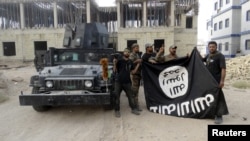Success in the battle against Middle East insurgents, such as the Islamic State group and al-Qaida affiliates, is going to lead to a new challenge, diplomats and intelligence officials are warning.
Destroying the strongholds of the groups will mean thousands of hardline fundamentalist militants, mostly from IS (the group also known as ISIS, ISIL or Daesh), may return to their home countries from Syria and Iraq and carry out terrorist attacks, U.S. Deputy Secretary of State Tony Blinken and other diplomats warned Wednesday at a meeting of the Global Counterterrorism Forum (GCTF).
“We all need to be on notice as we collapse the foundation of the so-called caliphate in Iraq and Syria, [that Islamic State] will continue and indeed emphasize these kind of indiscriminate terror attacks in all of our countries,” Blinken said.
Infiltration feared
European officials acknowledge they are well aware of the threat.
“Where are all of these fighters going to go?” Dutch Minister of Foreign Affairs Bert Koenders asked in a VOA interview. “Are they going to spread to other conflict areas or they are returning to our societies?”
European intelligence agencies have been criticized for a lack of effective coordination. And Koenders acknowledges that a lesson learned from the bombings in Brussels in March of this year was “that sharing information is not enough.”
The Dutch foreign minister, however, said things have improved.
“You can never stop all attacks. But I see in what we have been doing in the last couple of years, very operational [coordination] between European countries, that we really are in a process of very, very seriously... containing this problem,” Koenders told VOA.
But U.S. officials continue to express concern.
“There’s still a ton of work to do to improve that sharing both between the EU and the U.S., but also between EU partners,” according to Francis Taylor, the undersecretary for intelligence and analysis for the U.S. Department of Homeland Security. Taylor discussed the issue August 30 at the Center for Strategic and International Studies in Washington.
Soft target protection
Blinken, at Wednesday’s GCTF ministerial meeting co-chaired by Morocco and the Netherlands, announced that the United States, in partnership with Turkey, is launching an initiative to better protect “soft targets” from terrorist attacks.
“The United States will provide $1 million to help fund this research effort which we believe, with Turkey, could save many lives,” Blinken said.
The objective of the initiative is “to raise awareness, identify needs and leverage the expertise and experience of governments and industry to better protect potential soft targets – like restaurants, sports arenas, hotels and so forth – from extremist attack, whether by organized groups or by individuals intent on doing harm both to their neighbors and to themselves,” according to a State Department statement, which explains that the goal is to help “enhance the security and resilience of sites that are potential soft targets.”
Diplomats are also touting another just-announced GCTF initiative: a website and mobile phone app for policy-makers and others to develop their own programs to eliminate the “life cycle of radicalization to violence, from prevention to intervention, to rehabilitation and reintegration.”
Full details of that program are to be announced Thursday, and an explanatory video is available.
The GCTF, launched five years ago, focuses on identifying critical civilian counterterrorism needs and mobilizing the necessary expertise and resources. It is composed of 29 countries and the European Union.
VOA National Security Correspondent Jeff Seldin contributed to this report from Washington.






